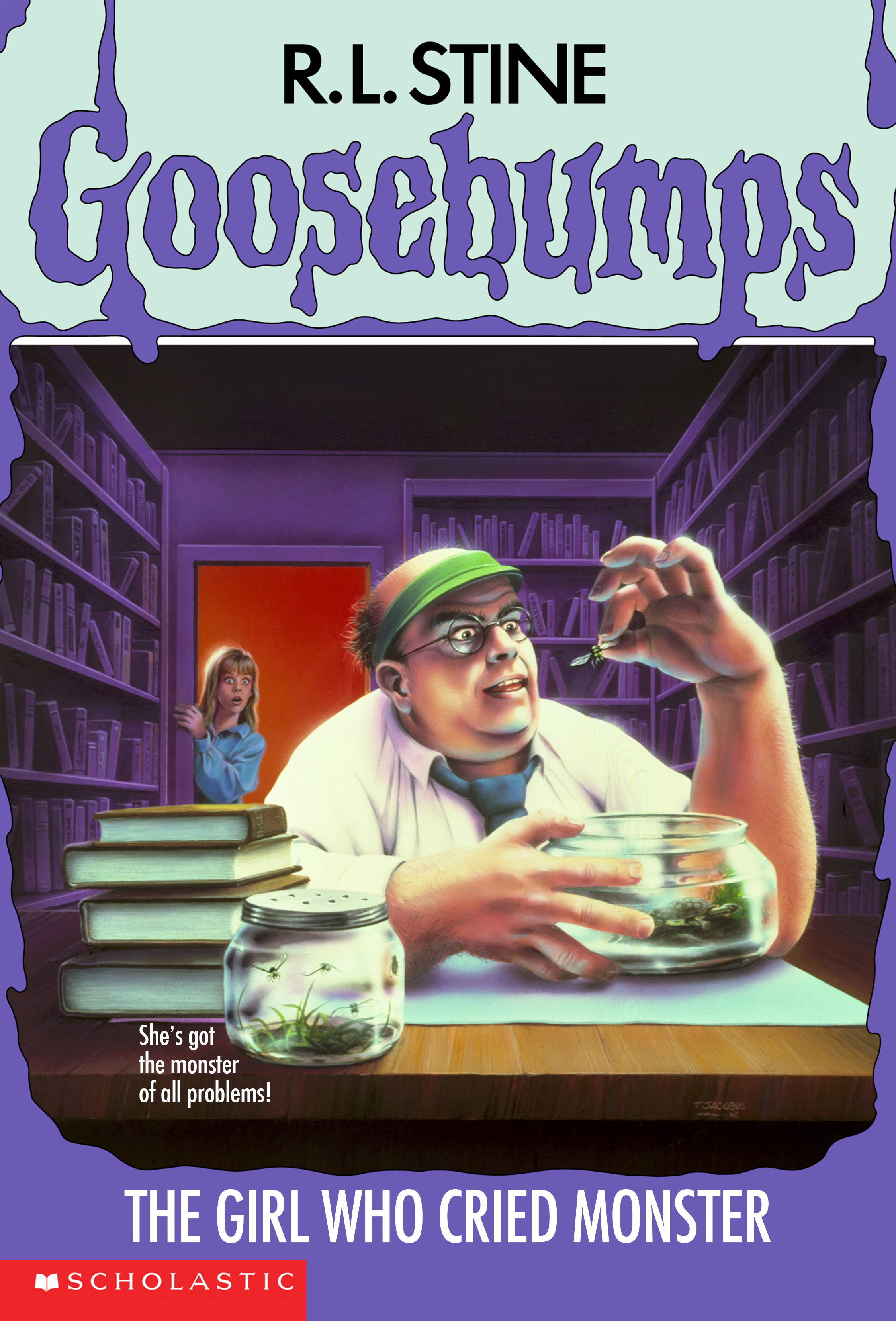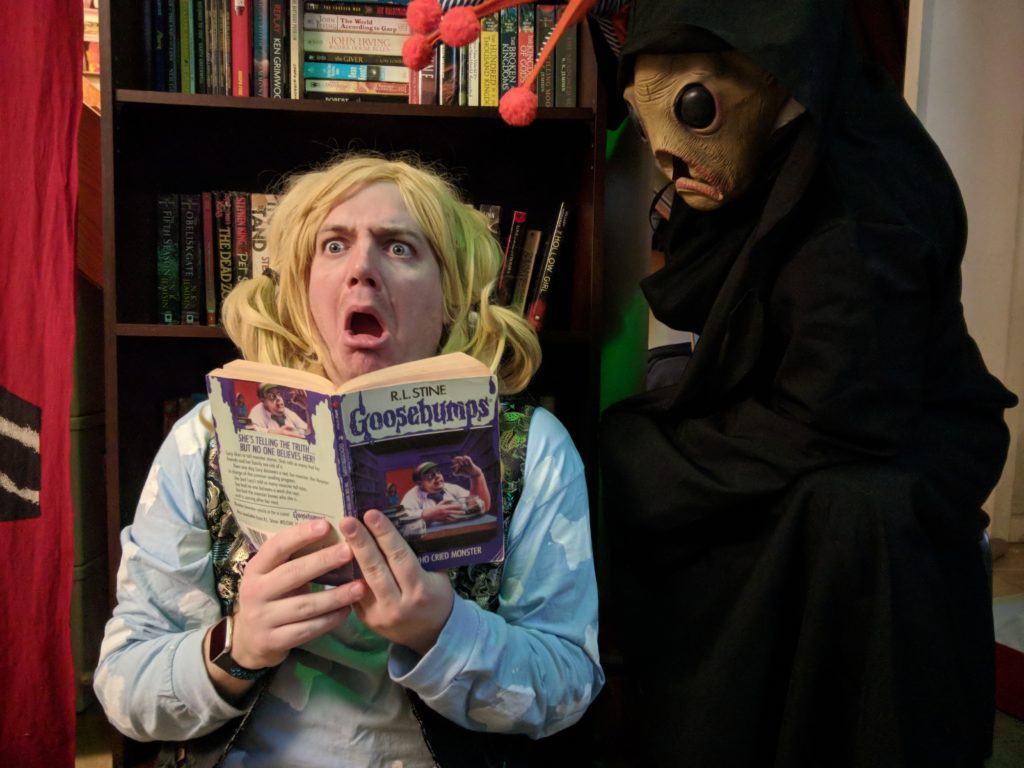
Goosebumps #8:
The Girl Who Cried Monster
© 1993 by Parachute Press. Cover Art by Tim Jacobus.
Spoiler-Free Review
The eighth Goosebumps book is about a monster librarian who likes to remove his human face and eat flies after the library closes. It’s told through the point of view of a child who’s obsessed with monsters and seems dead set on snitching. From the beginning, I really liked Mr. Mortman. I thought of him as a sweaty, book-loving, fly-eating monster. This book thankfully didn’t waste a lot of time with fake scares, but it did get a bit repetitious with Lucy hiding out in the library trying to “catch Mr. Mortman. The twist ending came out of left field and was very abrupt; I found myself wanting to have more story following the reveal. Overall, I didn’t love it and I didn’t hate it, putting it squarely in the middle of the road.
Score: 2.5
If you enjoy my blog, please consider liking my reviews on GoodReads.
It might not seem like much, but it has a big impact!
 Ermahgerd #8: The Girl Who Cried Monster.
Ermahgerd #8: The Girl Who Cried Monster.
© 2019 by Daniel Stalter. All rights reserved.
Photo collaboration with Lindsay Pacelli.
Observations & Spoilers
The inciting incident that kicked off the story was Lucy forgetting her rollerblades at the library. Had she not gone back for them, she never would have seen Mr. Mortman de-face and eat his flies. There is something quintessentially 90s about rollerblading. It’s one of those things that was huge for a few years, then it died a quick death and never managed a comeback. You knew rollerblading was cool because the Power Rangers all had matching rollerblades. I don’t really have a point here, I just loved that rollerblades were an essential part of the plot.
Right off the bat, Mr. Mortman just seems goofy and kinda gross, but definitely not scary. The only tension in the story wondering what he might do if he catches Lucy spying on him. The worse thing he does is eat flies and have sweaty palms. Minus the Flies, I think I found him relatable. I found myself wanting Lucy to just leave him alone and let him go about lending his books. I think the primary reason for my thinking here is that monsters in popular culture have consistently been presented as more “fun” than “nefarious” in recent years. Take Pixar’s Monsters, Inc for a perfect example.
At some point, I realized that Mr. Mortman was the real protagonist; a feeling that was vindicated by the twist ending. Lucy is obsessed with monsters from page one. She loves scaring her little brother with all of the different monsters she makes up. So when she tells her parents that Mr. Mortman takes his face off and eats flies after the library closes, they don’t believe her. Therefore, the bulk of the book is made up of Lucy attempting to prove to her parents that Mr. Mortman is, in fact, a monster. All she had to do was mind her own fucking business and not be a snitch, and Mr. Mortman could have gone on eating flies and loving books. Snitches get stitches, Lucy.
The book ends with Lucy’s parents finally believing her and inviting Mr. Mortman over for dinner, where they promptly eat him in front of their two children. See, Lucy’s whole family are monsters and they don’t want any other monsters poking around their nice little suburb. I guess it explains why Lucy is so obsessed and determined to prove her case to her parents, but it came so abruptly on the second to last page of the book that it was more confusing than satisfying. I was reminded of that scene in Deep Blue Sea (a movie I have never seen) where a shark comes out of nowhere and eats Samuel L. Jackson.
Ultimately, I wanted more stories after the big reveal. I wanted more than just Lucy explaining how she knew this all along but didn’t happen to mention it. Reveals like this work best when the protagonist is surprised but then, too. Then again, Lucy wasn’t the real protagonist, was she?
Score Card
For the scoring of each book, I decided to rate them based on five criteria worth 2 points each.
I then split that in two to give it a rating out of 5 stars. Those criteria are:
Concept: the strength of the overall idea
Execution: the mechanics of storytelling
Character: the protagonists, antagonists, and villains
Intent: does it succeed in being the kind of book it wants to be?
Originality: subversion and reliance on genre tropes
Concept: 1/2
The concept was solid enough, though it doesn’t go much deeper than having monsters masquerade as humans. With the twist saved until the very end, we didn’t get to find out much more about the world that Lucy lives in. I like the idea, it just felt incomplete and left me wanting more.
Execution: 1/2
My biggest frustration in Night of the Living Dummy was that a full two-thirds of the book is wasted on fake scares; this one thankfully avoided that pitfall and gets right down to business pretty early on. Where it fails is that we have a lot of repetition with Lucy spying and almost getting caught. I think it also suffered for holding out its big reveal until the second-to-last page.
Character: 2/2
The main characters here were pretty solid, and even though Lucy’s motives were masked until the end, they still make sense. I liked Mr. Mortman and was sad that he got eaten.
Intent: 0/2
Maybe it’s the “monsters are fun now” trend, but this one didn’t really check any boxes so far as being scary. Sweaty palms and eating flies are not enough.
Originality: 1/2
Humans secretly being monsters isn’t original, but the context this was presented in was. At the very least, it did not fall back on cliches.
Based on GoodReads aggregate ratings, The Girl Who Cried Monster is:
Ranked 54th of 62 books in the original Goosebumps series.
TV Adaptation – Bullet Review
For every book that was adapted for the Goosebumps TV series, I will watch and do a bullet review.
“The Girl Who Cried Monster” is Episode 1×04.
• This was the second episode to air in the series, and therefore the first of the half-hour adaptations.
• Mr. Mortman was way less fun and far more nefarious in this adaptation.
• Kudos to making Lucy’s best friend Aaron black. There was definitely not enough diversity in this show.
• The book followed the plot pretty closely, and the parts it cut were the repetitious hiding/spying scenes. The episode was better for it.
• I like the tough of extending out the final scene after the reveal to have Lucy’s friend Aaron stop by. It gave it a bit more breathing room than the book allowed.
• This might be one of the few adaptations that are both scarier than the book and benefits from being condensed into a half-hour time slot.
Don’t miss the next blog in this series:
Goosebumps #9: Welcome to Camp Nightmare
0 Comments